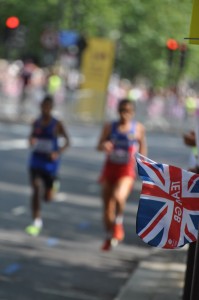The Olympics Effect
 The Olympics effect?
The Olympics effect?
“What is that?,” you may ask.
Fitness centers report an upsurge in enrollments because of the Olympics, and “the Olympics effect” is given the credit for this upsurge.
But, no, that is not what I mean by the Olympics effect.
That’s the positive result from folks watching the Olympics on TV.
Let’s talk about some negative impacts on us endurance runners and walkers.
Dangerous Change in Gait
Guilty as charged. Here in the USA, I kept seeing AT&T TV commercials featuring Ryan Hall. He has a great kick, and I decided one morning last week to try to imitate a bit of his gait while performing my speed-training. I’m typically more of a shuffler, and, oh, what a rookie mistake that was! While I was faster than usual, I paid for it later — with a lot of calf soreness that persisted from Tuesday afternoon into Sunday.
Changing my gait from heal-and-toe shuffling at a slower pace to midfoot-striking at a speed-work pace for eight one-minute intervals was enough to “kill” my calves for several days.
Lesson Learned: Use what you see on TV as inspiration, not necessarily as something to imitate, at least not right away.
Believing that Event = Process
I have been harping on this for a while now — not to confuse events with processes. An event such as a 100-meter dash gives us only a tiny view into an athlete’s life. There are years and years of preparation — the process — behind what we tune in to see as an event.
There is even the day-of process prior to the event. For example, Michael Phelps admitted to Bob Costas in an NBC TV interview after Phelps did not “medal” in one of his London 2012 finals that he had not adequately prepared himself that morning for the event.
Lesson Learned: Pay attention to the “back” stories — often told well through short documentaries — of successful athletes. You will see that these athletes thrive and excel through processes, not events.
Destruction of Willpower
Destruction of willpower? Is that confusing? Are you wondering, “Aren’t the Olympics a source of inspiration, and shouldn’t inspiration build willpower?”
That is an excellent rhetorical question. Generally, I agree with the premise.
However, based on recent personal experience and some new research, I have to say that watching the Olympics can destroy willpower.
How can that be?!
I noticed over the past two Saturdays that the endurance runners in my group training program were struggling more than usual with our long runs. I also noticed, though, that they were excited to talk about what they had seen on TV while watching the London 2012 games.
I had been staying up late to watch here in the USA the delayed broadcasts of the games, and other runners whom I polled were doing the same thing!
Was there a connection between the later-than-usual TV watching and our long-run struggles? Absolutely! According to Kelly McGonigal, Ph.D., author of The Willpower Instinct, insufficient sleep destroys willpower. (She discusses the neurophysiology behind this in her book.)
Lesson Learned: Get sufficient sleep, so that you support, instead of defeat, the willpower that you will need in longer runs or walks.
Putting It All Together
Put simply, the lessons learned here mean:
- You have to take care of your sleep.
- Recognize the processes behind the events.
- Successful imitation often takes time.
How did watching the London 2012 Olympics affect your happiness — positively or negatively — as an endurance runner or walker? Please leave a comment below. Thanks!